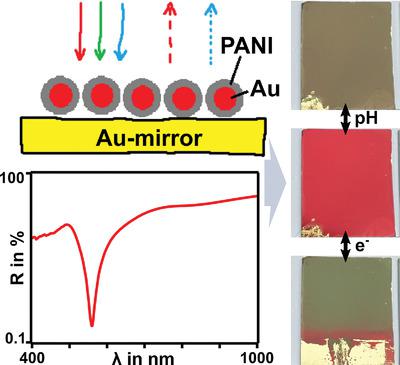当前位置:
X-MOL 学术
›
Macromol. Rapid Commun.
›
论文详情
Our official English website, www.x-mol.net, welcomes your feedback! (Note: you will need to create a separate account there.)
A Tunable Polymer-Metal Based Anti-Reflective Metasurface.
Macromolecular Rapid Communications ( IF 4.6 ) Pub Date : 2019-11-29 , DOI: 10.1002/marc.201900415 Yannic Brasse 1 , Charlene Ng 1 , Michele Magnozzi 2, 3 , Heyou Zhang 4 , Paul Mulvaney 4 , Andreas Fery 5 , Daniel E Gómez 6
Macromolecular Rapid Communications ( IF 4.6 ) Pub Date : 2019-11-29 , DOI: 10.1002/marc.201900415 Yannic Brasse 1 , Charlene Ng 1 , Michele Magnozzi 2, 3 , Heyou Zhang 4 , Paul Mulvaney 4 , Andreas Fery 5 , Daniel E Gómez 6
Affiliation

|
Anti-reflective surfaces are of great interest for optical devices, sensing, photovoltaics, and photocatalysis. However, most of the anti-reflective surfaces lack in situ tunability of the extinction with respect to wavelength. This communication demonstrates a tunable anti-reflective surface based on colloidal particles comprising a metal core with an electrochromic polymer shell. Random deposition of these particles on a reflective surface results in a decrease in the reflectance of up to 99.8% at the localized surface plasmon resonance frequency. This narrow band feature can be tuned by varying the pH or by application of an electric potential, resulting in wavelength shifts of up to 30 nm. Electrophoretic particle deposition is shown to be an efficient method for controlling the interparticle distance and thereby further optimizing the overall efficiency of the anti-reflective metasurface.
中文翻译:

基于可调谐聚合物金属的抗反射超颖表面。
抗反射表面对于光学器件,传感,光伏和光催化非常感兴趣。然而,大多数抗反射表面相对于波长缺乏消光的原位可调性。这种交流展示了一种基于胶体粒子的可调抗反射表面,该胶体粒子包含带有电致变色聚合物壳的金属核。这些粒子在反射表面上的随机沉积会导致在局部表面等离振子共振频率处反射率降低多达99.8%。可以通过改变pH值或施加电势来调节此窄带特征,从而导致波长偏移最多30 nm。
更新日期:2019-11-30
中文翻译:

基于可调谐聚合物金属的抗反射超颖表面。
抗反射表面对于光学器件,传感,光伏和光催化非常感兴趣。然而,大多数抗反射表面相对于波长缺乏消光的原位可调性。这种交流展示了一种基于胶体粒子的可调抗反射表面,该胶体粒子包含带有电致变色聚合物壳的金属核。这些粒子在反射表面上的随机沉积会导致在局部表面等离振子共振频率处反射率降低多达99.8%。可以通过改变pH值或施加电势来调节此窄带特征,从而导致波长偏移最多30 nm。


























 京公网安备 11010802027423号
京公网安备 11010802027423号